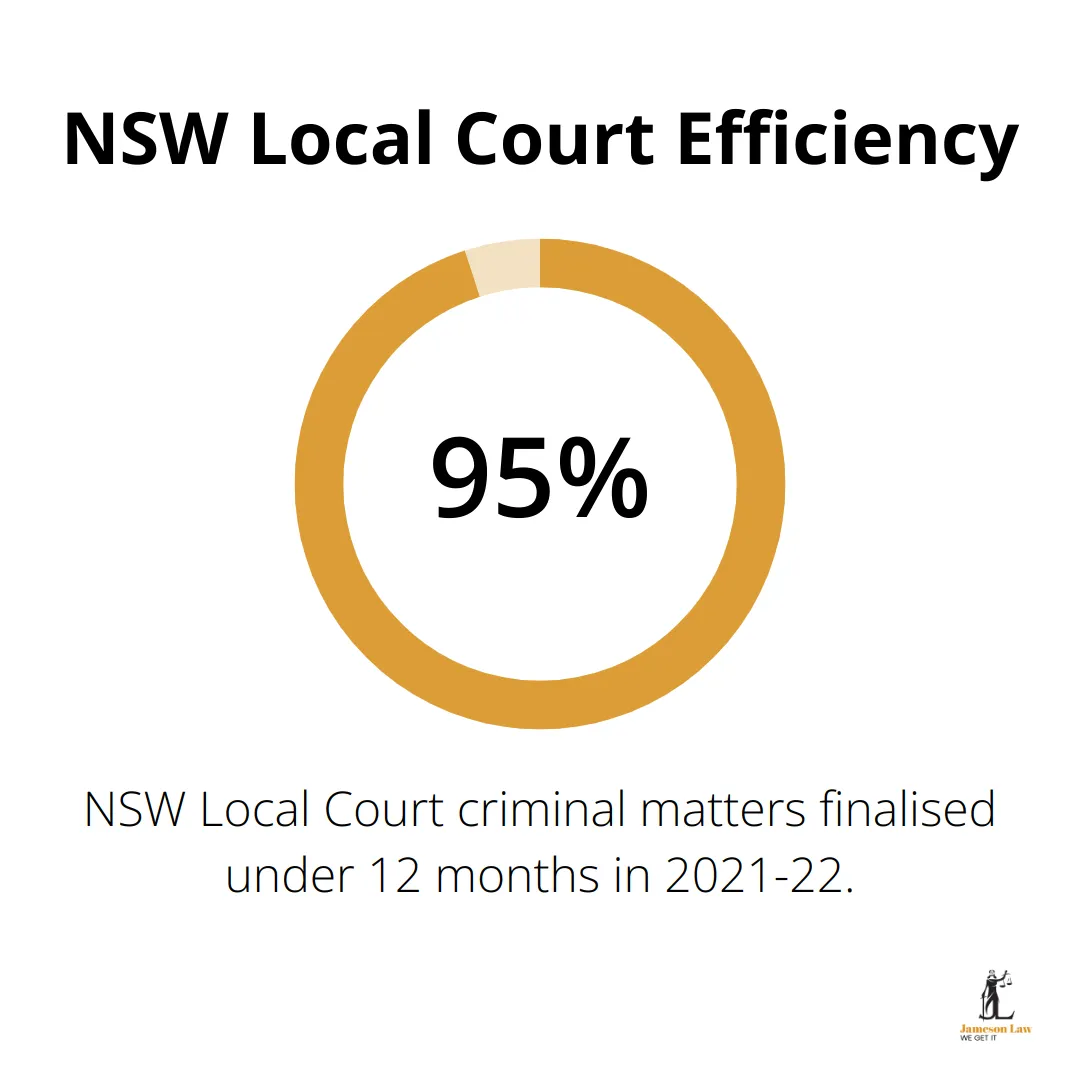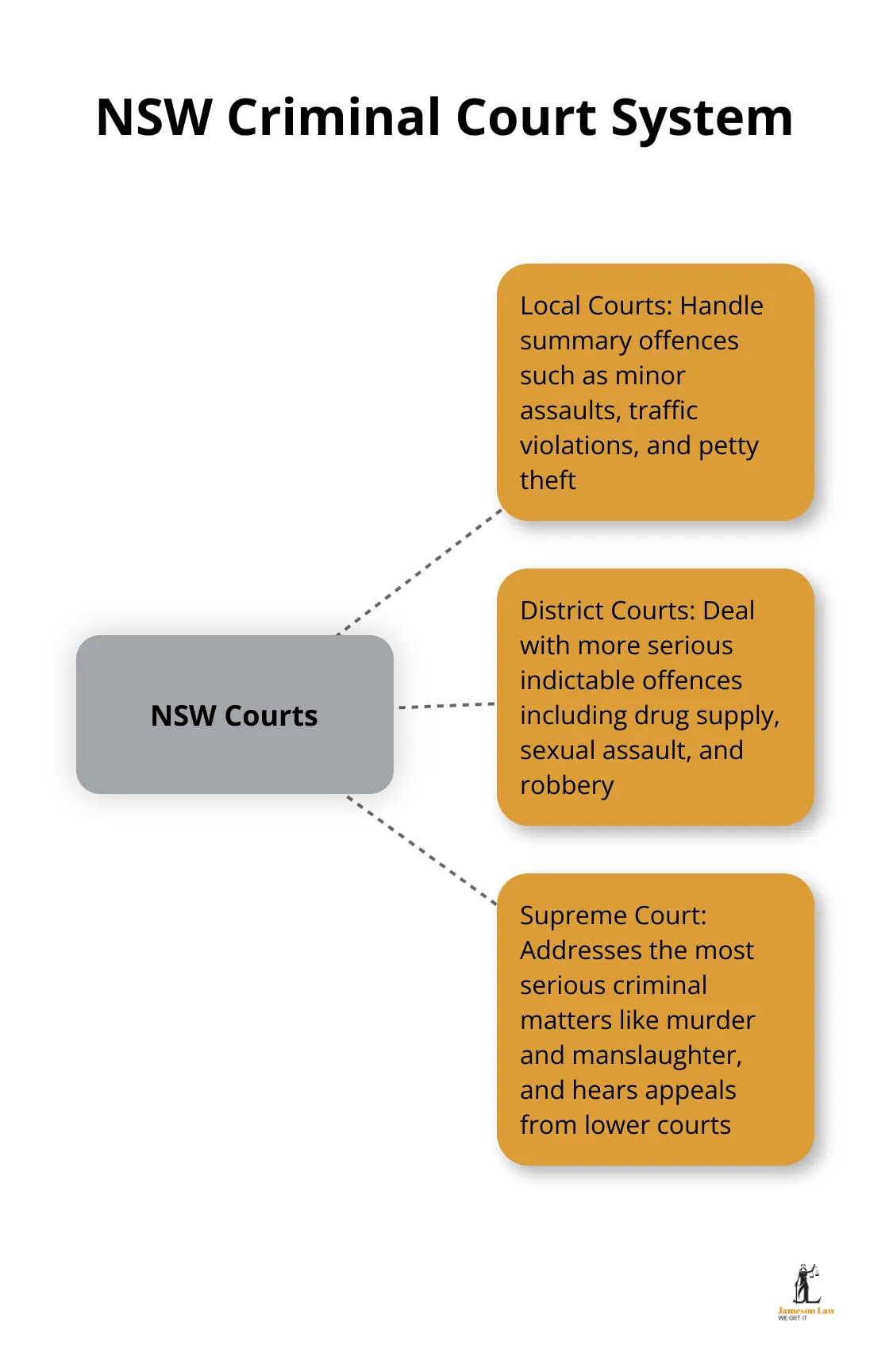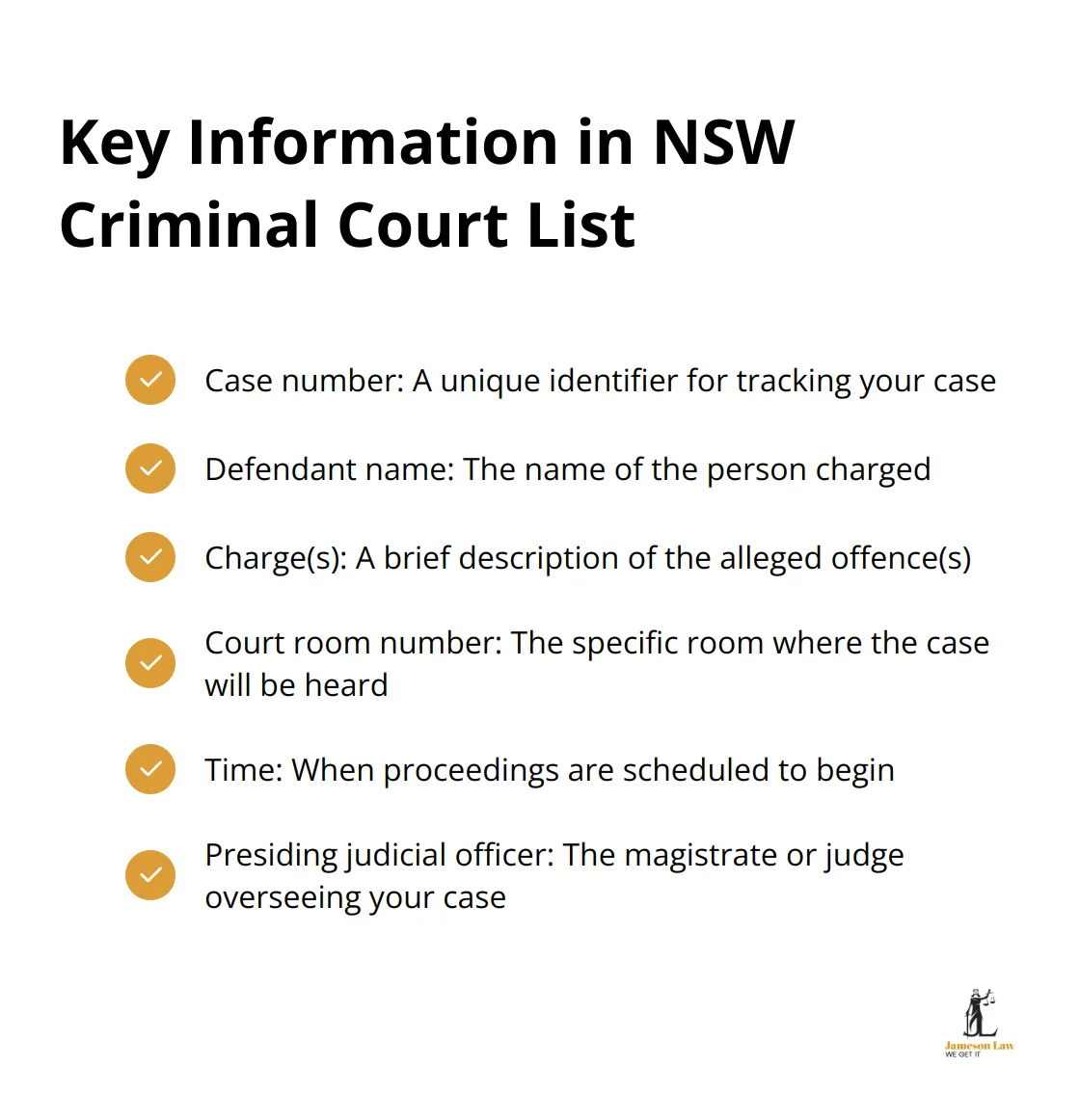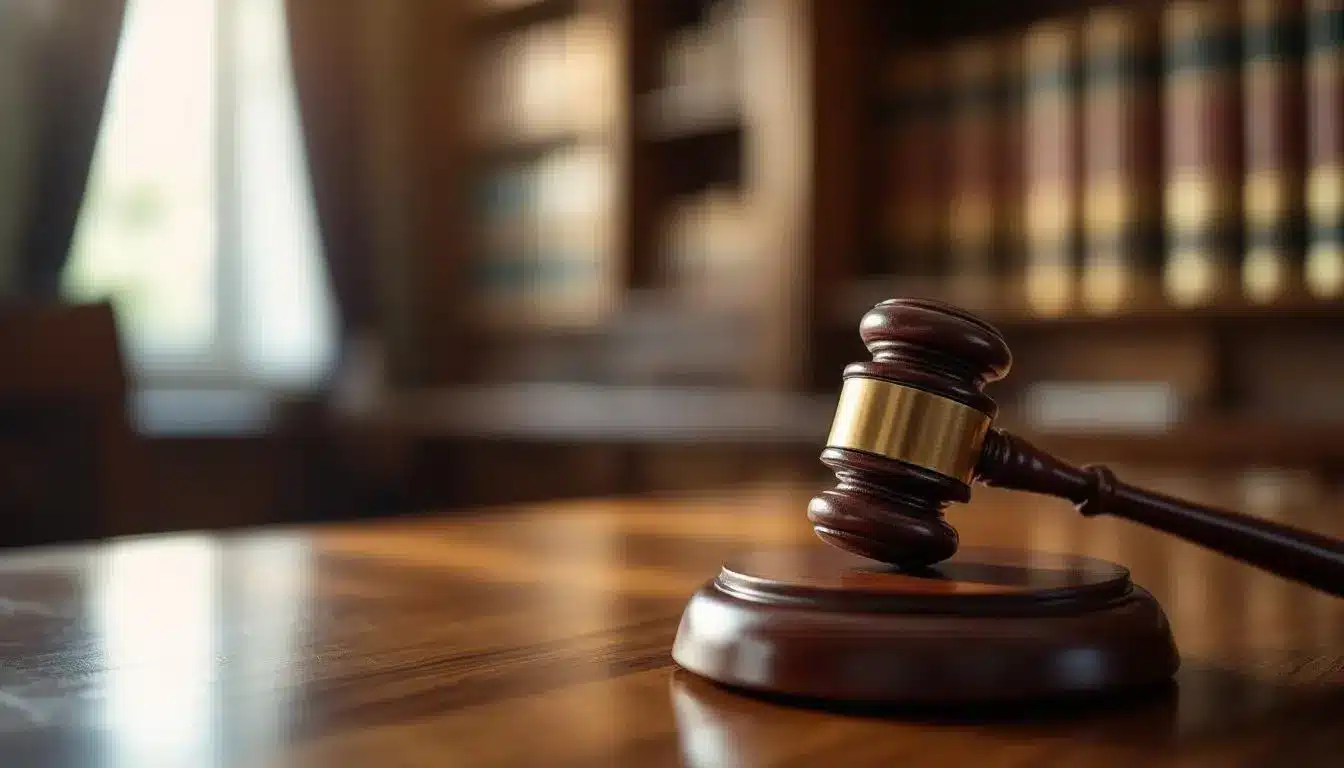Navigating the NSW criminal court system can be daunting for those unfamiliar with legal processes.
At Jameson Law, we understand the importance of being well-informed about court proceedings.
This guide will help you understand the Criminal Court List NSW, its structure, and how to access vital information for your case.
How Does the NSW Criminal Court System Work?
Local Courts: The First Port of Call
The NSW criminal court system handles a wide range of offences, from minor infractions to serious crimes. Most criminal cases in NSW start in the Local Court. These courts address summary offences, which are generally less serious crimes. Common examples include minor assaults, traffic violations, and petty theft. Magistrates preside over Local Courts, which operate in a more streamlined manner compared to higher courts.
The Local Court is nation-leading with 95.1% of criminal matters finalised under 12 months in 2021-22. If you face charges in a Local Court, you should know that these proceedings move quickly. Preparation is key, and legal representation can significantly impact the outcome of your case.

District Courts: Handling More Serious Offences
The District Court of NSW deals with more serious indictable offences. These include drug supply, sexual assault, and robbery. Unlike Local Courts, District Court cases typically involve a judge and jury, although some cases may be heard by a judge alone.
The complexity of cases heard in the District Court often requires more extensive legal preparation and expertise.
Supreme Court: The Highest Court in NSW
At the apex of the NSW court system sits the Supreme Court. This court handles the most serious criminal matters, including murder and manslaughter. The Supreme Court also hears appeals from lower courts.
Given the gravity of cases heard in the Supreme Court, experienced legal representation is essential.
Navigating the System
Understanding which court will hear your case is vital for proper preparation. The court that hears your case can significantly impact potential penalties and the overall legal process. For instance, some offences can be addressed in either the Local or District Court.
The NSW criminal court system can be complex, but with the right knowledge and legal support, you can approach your case with confidence. Whether you face charges in a Local, District, or Supreme Court, understanding the system is your first step towards a strong defence. Now, let’s explore the types of criminal cases heard in NSW courts to further clarify the role of each court in the justice system.
What Cases Do NSW Courts Handle?
Local Court Cases: Handling Summary Offences
Local Courts in NSW address summary offences, which are typically less serious crimes. These include traffic offences, minor assaults, and petty theft. The NSW Bureau of Crime Statistics and Research reports that Local Courts finalised 306,024 criminal cases in 2022. This high volume showcases the court’s efficiency in managing less complex matters.
A common example of a Local Court case involves first-time drink driving offences. Penalties for such cases can range from fines to licence disqualification (depending on the offence’s severity). Even for these seemingly minor offences, legal representation can significantly impact the outcome.
District Court Matters: Tackling Serious Indictable Offences
The District Court of NSW handles more serious indictable offences. These include drug supply, sexual assault, and robbery. The NSW Bureau of Crime Statistics and Research (BOCSAR) provides large datasets of state-wide unit record de-identified police and court data for child sexual offences.
A typical case in the District Court might involve a charge of drug supply. These cases often require complex evidence and legal arguments, making experienced legal representation essential. Penalties for such offences can be severe and potentially include lengthy prison sentences.

Supreme Court Proceedings: Addressing the Most Serious Crimes
The Supreme Court of NSW deals with the most serious criminal matters, such as murder and manslaughter. The Supreme Court finalised 94.1% of matters in under 12 months, a figure exceeded only by South Australia.
A high-profile example of a Supreme Court case was the trial of Leonard Warwick (the so-called ‘Family Court bomber’), which concluded in 2020. This case, involving multiple murders and bombings, demonstrates the serious nature of Supreme Court matters.
The Importance of Understanding Court Levels
Each court level in NSW has its own procedures and potential outcomes. This makes it essential for anyone facing criminal charges to seek appropriate legal advice. Experienced lawyers can provide tailored representation regardless of a case’s complexity.
As we move forward, it’s important to understand how to navigate the NSW Criminal Court List. This knowledge will help you prepare effectively for your court appearance and understand what to expect during the legal process.
How to Navigate the NSW Criminal Court List
Accessing the Court List
The NSW Criminal Court List provides essential information about upcoming court appearances. You can access this online resource through the NSW Online Registry. Visit the official website of the NSW Courts, navigate to the Online Registry section, and select the Criminal Court List option. To find relevant information, you must enter specific details such as the court location, date, and case number or defendant name.
For those without internet access, most courthouses offer public computers to check the list. You can also call the court directly to inquire about your listing.
Understanding Court List Information
When you locate your case on the list, you’ll find several key pieces of information:
- Case number (a unique identifier for tracking your case)
- Defendant name
- Charge(s) (a brief description of the alleged offence(s))
- Court room number
- Time (when proceedings are scheduled to begin)
- Presiding judicial officer (the magistrate or judge overseeing your case)
It’s vital to understand these details for a smooth court experience. If any information appears incorrect, contact the court or your legal representative immediately.

Regular Checks Are Essential
Court schedules can change unexpectedly. Cases may move, face delays, or even start earlier than planned. To avoid missing your court date or arriving at the wrong time, check the list regularly before your scheduled appearance.
Failure to appear in court can result in additional charges and penalties. Staying informed through the court list helps you avoid these unnecessary complications.
We recommend you check the list at least 24 hours before your scheduled appearance and again on the morning of your court date. This diligence ensures you’re always up-to-date with any last-minute changes.
Preparing for Your Court Appearance
Once you’ve confirmed your court details, you can prepare effectively for your day in court. Try to arrive at least 30 minutes early to allow time for security checks and to locate your courtroom. Dress appropriately (neat and conservative attire is best) and bring any necessary documents or evidence.
If you’re representing yourself, familiarise yourself with basic court etiquette (such as addressing the judge as “Your Honour”). However, given the complexities of the legal system, professional legal representation can significantly impact your case outcome.
Seeking Legal Assistance
Navigating the NSW Criminal Court List and preparing for court can be challenging. If you need help understanding the court process or require legal representation, consider seeking assistance from a qualified legal professional. Jameson Law offers expert guidance in criminal law matters and can help you navigate the NSW court system effectively.
Final Thoughts
The Criminal Court List NSW provides essential information for court appearances. You must check this list regularly to stay informed about your case details and any schedule changes. Understanding the three-tiered structure of Local, District, and Supreme Courts will help you prepare for your specific court proceedings.
Professional legal representation can significantly impact the outcome of your case. A skilled lawyer will guide you through the complexities of the criminal justice system and protect your rights. They can also help you interpret the court list and prepare effectively for your appearance.
At Jameson Law, we offer expert guidance in criminal law matters. Our experienced team understands the nuances of criminal proceedings and strives to achieve the best possible outcomes for our clients. Don’t face the NSW criminal justice system alone; seek professional legal assistance to present your case in the strongest light.













